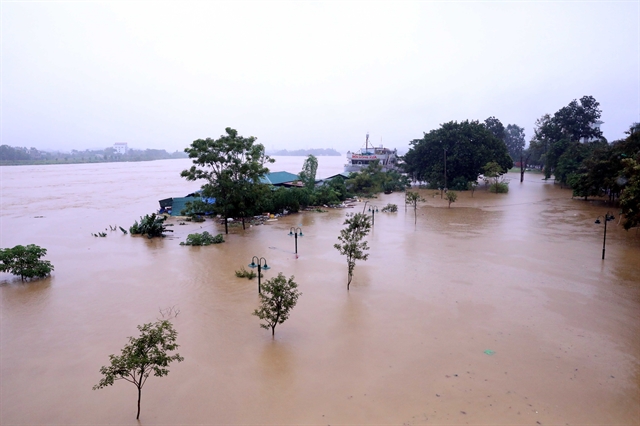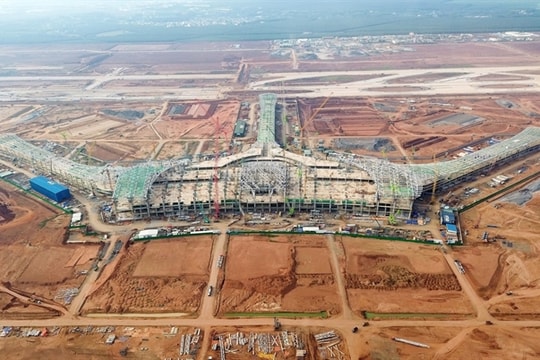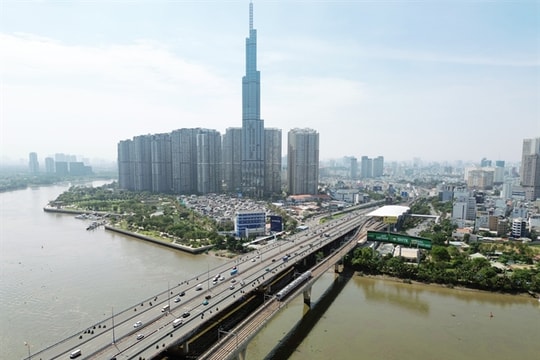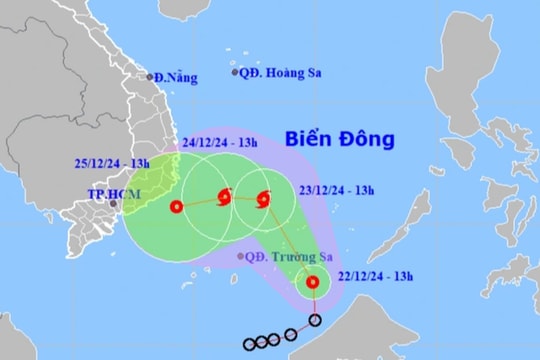 |
| Flooding caused by overflowing Lô River in Tuyên Quang Province. — VNA/VNS Photo |
HÀ NỘI — Deputy Minister of Agriculture and Rural Development Nguyễn Hoàng Hiệp on Wednesday afternoon confirmed that China had notified Việt Nam of its plan to release water from a hydropower dam upstream of the Lô River.
The Lô River, originating from China's Yunnan, flows into Việt Nam at Hà Giang Province and through Tuyên Quang and Phú Thọ provinces. It is also a tributary of the Red River.
"They have sent us a written notice early on to allow us time to prepare. The discharge rate is small, only 250cu.m per second, so while it has an impact, it will not significantly affect downstream flooding in Việt Nam," the official told the Việt Nam Government Portal, amid concerns that further discharges will exacerbate the flooding situation in the northern mountainous areas.
Hiệp stated that the average discharge rate of one spillway at the Hòa Bình Hydropower Plant is 1,800cu.m per second, so China's release is relatively low.
Also related to the move, the Vietnamese foreign ministry said that while China supports flood prevention in Việt Nam, due to heavy rainfall over several days, the water level of Ma Lu Thang hydropower dam in China has risen significantly, posing a risk of dam failure, which would result in catastrophic damages for both countries.
After careful consideration, China has informed the border province of Hà Giang in Việt Nam that it plans to release water from the the dam from 3:00pm on September 11 to 2pm on September 12, with a maximum discharge volume of 250cu.m per second.
Following discussions with Việt Nam's authorities, China has agreed to reduce the maximum discharge volume down to 200cu.m and delay the release time to 4:30pm on September 11.
China also stated that it has instructed relevant localities to ensure that the discharge is kept to the minimum necessary to ensure the dam's safety.
The People's Committee of Hà Giang Province has also issued an emergency response plan to prepare for the potential impacts of the water release from China’s hydropower plant.
To proactively respond and minimise damage from the increased water levels that could cause flooding in the city, Chairman of the Hà Giang City People's Committee instructed the communes and wards (Ngọc Đường, Phương Độ, Phương Thiện, Quang Trung, Minh Khai, Nguyễn Trãi, Trần Phú) to closely monitor the updates on the water release and implement disaster response plans to minimise any potential damage.
"Provinces downstream of major rivers should remain on high alert for flooding and ensure the safety of dikes, as water levels continue to rise," Hiệp noted.
As of 3pm on September 11, Hòa Bình Hydropower Plant has closed all its spillways, while Tuyên Quang Hydropower Plant still has four bottom outlets open.
On Tuesday, the Ministry of Foreign Affairs said it has communicated with the Chinese side to make sure China strictly regulate the flower of water from the upper reaches of the Red River to downstream regions, while Việt Nam deals with severe flooding and landslides in the wake of powerful Typhoon Yagi from last weekend.
Regarding the upper reaches of the Yuan/Red River, China confirmed that none of its hydropower plants or dams are releasing water, the foreign ministry added. — VNS





























